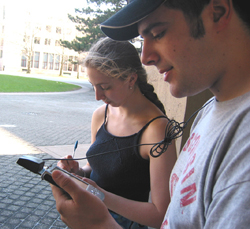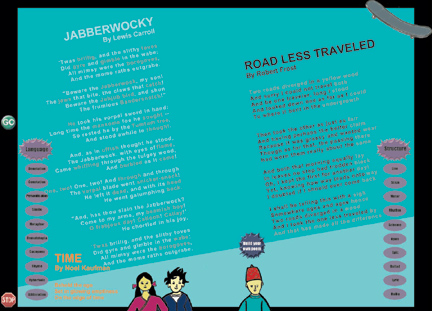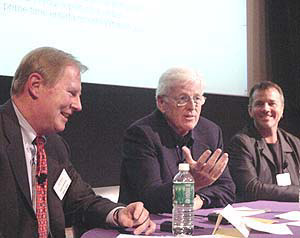Comparative Media Studies
Established as a graduate program in 1999–2000, Comparative Media Studies (CMS) aims to integrate the study of contemporary media (film, television, digital systems) with a broad historical understanding of older forms of human expression. The program embraces theoretical and interpretive principles drawn from the central humanistic disciplines of literary study, history, anthropology, art history, and film studies and aims as well for a comparative synthesis that is responsive to the distinctive emerging media culture of the 21st century. Students in the program are taught to explore the complexity of our media environment by learning to think across media and to see beyond the boundaries imposed by older medium-specific approaches to the study of audiovisual and literary forms.
The comparative and cross-disciplinary nature of both the graduate and undergraduate programs is embodied in a faculty drawn from the Departments of Art and Architecture; Anthropology; Foreign Languages and Literatures; History; Literature; Music and Theater Arts; Philosophy; Writing and Humanistic Studies; Science, Technology, and Society; Media Arts and Sciences; Political Science; and Urban Studies and Planning. Approximately 35 faculty members teach subjects in Comparative Media Studies.
The graduate program consists of a two-year course of study leading to a Master of Science degree. The program aims to prepare students for careers in fields such as journalism, teaching and research, government and public service, museum work, information science, corporate consulting, media industry marketing and management, and educational technology. Fields in which our recent graduates are working include higher education, teaching, journalism, photojournalism, and consulting at media and technology firms and media production companies.
Research
Themes
CMS research themes cross academic disciplines and involve both traditional and emerging communications media, establishing a focus for public presentations, research agendas, and curricular initiatives. The primary research themes are Creativity and Communication in an Interactive Age; Generation.org: Childhood and Adolescence in a Hyper-Mediated Culture; Informed Citizenship and the Culture of Democracy; Global Culture and Media; Media in Transition; and Transforming Humanities Education.
In 2002–2003, CMS ran three lab groups—Creativity and Communication in a Digital Age, Global Culture and Media, and Transforming Humanities Education—that met weekly. CMS faculty, research staff, and visiting scholars, as well as other professionals and collaborators, led weekly discussions around both relevant theoretical scholarship in each area and how such ideas could be applied to the project-specific work being pursued by each group.
Projects
 Students playing the Environmental Detectives game on GPS-guided Pocket PCs. |
In its second year, the iCampus Games-to-Teach Project, run in partnership with the Learning Sciences and Technologies Group of Microsoft Research, focused on the interactive, immersive, and narrative potential of digital games as an educational medium. Over the past year, CMS explored new pedagogical models using games and applied these models to a series of conceptual game prototypes designed to support advanced high school and first-year college humanities and social sciences curricula, adding to the previous models for science and engineering that were developed during the first year. In addition, the CMS research team developed two working prototypes of games to support education in electromagnetism and environmental engineering, testing and assessing those with students at MIT and at local high schools.
The Meta-Media Archive Project, funded by the D'Arbeloff Award for Excellence in Education, continued development of interactive archive models for use across a broader range of topics in the humanities and social sciences; early projects included work in Shakespeare, Melville, German and Spanish language and culture, oral history, early comic strips, and dance. Intended to serve as modules that teachers and students could use to explore rich subject areas, create rhetorical multimedia documents, and collaborate over the internet, early Meta-Media Archives have stretched instructors' and students' notions of textbook, research paper, and classroom. Work has begun on an archival project with the Royal Shakespeare Company that will make resources available through Meta-Media and OpenCourseWare projects.
Japan in World History, funded by the D'Arbeloff Award for Excellence in Education, has created a large database of cross-cultural visual images of Japan from 1853—when Commodore Matthew Perry forced feudal Japan to abandon its "closed country" policy—to the present. Elting E. Morison professor of history John Dower and Shigeru Miyagawa, the Kochi Prefecture–John Manjiro professor of Japanese language and culture, used this archive in teaching their course CMS.874 Visualizing Cultures in spring 2003, and a web site of the material will be launched on OpenCourseWare in September.
In the Performance and Digital Arts Project, funded by the D'Arbeloff Award for Excellence in Education, students create ever-expanding digital resources that are used in classes and performances. Working with the Artist-in-Residence Program of the MIT Office of the Arts, students interact with artists from various performance fields through workshops, lecture/demonstration sessions, and performance, document these events, and integrate the documentation into classroom teaching modules. Associate professor of theater arts Thomas DeFrantz is principle investigator of the project.
During the second year of working with Initiative Media, CMS graduate students continued to explore the way audiences relate to and interact with advertising. Using television as a point of entry and conducting a large-scale study around American Idol 2,the research team began to integrate learning about the way media consumers archive, appropriate, and recirculate media products around their favorite shows and franchises.
 Two pages from the LeapFrog Fliptime Project. These pages help students learn about the language and structure of poetry |
CMS worked with LeapFrog Enterprises to develop Fliptime, a cross-curricular prototype book intended for sixth to eighth graders on LeapFrog's QuantumPad. Following three characters on a magic skateboard through time, the story and activities support learning goals in astronomy, art, poetry, physics, geometry, and biology. CMS is working with students in Cambridge and the San Francisco Bay area to assess early development.
Over the past year, CMS worked with the American Theatre Wing to educate staff on the use of the World Wide Web in building communities and providing educational materials to its audience. This work culminated in the development and launch of a web site that serves as the Wing's new outreach to help raise awareness and provide resources for students who want to begin careers in the theater.
CMS is also working on a variety of research efforts and projects with the Royal Shakespeare Company, including the development of a computer game inspired by The Tempest,expansion of the Shakespeare Electronic Archive and Hamlet on the Ramparts, and experimentation with new rehearsal and performance techniques and technologies.
Fundraising
A continued goal of activities this past year was to develop and implement sustainable and scalable business, teaching, and research models within which faculty and graduate students could explore interdisciplinary research themes and educational priorities. As it continues to solidify administrative and academic infrastructures, CMS has focused on cultivating a broader range of sponsored research and gifts from corporations, individuals, and foundations.
A generous gift made in December 2002 by Ron Crane, an alumnus with a degree in electrical engineering and computer science (EECS) and a founder of 3Com, supported work being done with the Royal Shakespeare Company and the Media in Transition 3: Television Conference (May 2003).
Greg Shaw, another EECS alumnus and early supporter of the program, completed payments on his pledge to establish the Greg Shaw Technologist in Residence Fund; CMS will appoint the first visiting technologist in 2003–2004.
Gerald Katell, an MIT alumnus and CMS Advisory Group member, continued payment on the $1 million pledged to endow the Gerald L. Katell '62 Fellowship and Education Fund in Comparative Media Studies; over time, the fund will provide valuable fellowship support for graduate students, as well as discretionary funds for educational programs.
Governance
Professor of literature and comparative media studies Henry Jenkins is the director of Comparative Media Studies. Professor of comparative media studies William Uricchio is associate director. The program is under the auspices of three Humanities sections: Literature, Writing and Humanistic Studies, and Foreign Languages and Literatures. Administratively, CMS is housed in Literature.
The program is governed by a Steering Committee chaired by Professor Jenkins. Other committee members for 2002–2003 were Professor Uricchio; Professor Peter S. Donaldson, head of Literature; Professor James Paradis, head of Writing and Humanistic Studies; professor of literature David Thorburn; senior lecturer in writing and humanistic studies Edward Barrett; senior lecturer in music and theater arts Martin Marks; Professor Miyagawa; and S. C. Fang professor of Chinese languages and culture Jing Wang.
During 2002–2003, Comparative Media Studies had three active committees, besides the Steering Committee: the Curriculum Committee, chaired by associate professor of history Jeffrey Ravel; the Admissions Committee, chaired by associate professor of literature Diana Henderson; and the Orientation Committee, chaired by associate professor of literature Christina Klein.
Graduate Admissions
CMS continues to attract a diverse group of applicants and students. Our current cohort of 21 students includes 11 women, 1 African American student, and 11 international students from the following countries: Bulgaria, Spain, India, Chile, the Czech Republic, Singapore, Greece, Canada, and the United Kingdom.
For the previous three years, we have received almost exactly 100 applicants. The 99 applicants for admission in fall 2003 included 61 women, 6 minorities, and 34 international students. We admitted 14 students, and 11 have accepted, including 6 women and 2 international students.
During fall 2002, the program hosted four on-campus Information Sessions, which were designed to allow potential students to meet CMS faculty and students, evaluate opportunities through the program, and attend classes, events, and research group meetings. CMS also conducted online chat sessions to facilitate interaction with potential applicants who could not attend these on-campus sessions; online sessions were particularly popular with our international applicants.
Undergraduate Education
The undergraduate program—established in 1982 under its former name, Film and Media Studies—serves as preparation for advanced study in a range of scholarly and professional disciplines and also for careers in media or industry. The curriculum consists of more than 50 subjects arranged in three tiers and broadly subdivided into three areas or fields: comparative media, film, and digital studies. Concentrators, minors, joint-majors, and majors may specialize in one of these areas or map a coherent combination of subjects across these borders.
In spring 2003, Comparative Media Studies was approved as a full interdisciplinary major, effective fall 2003. CMS will be MIT's first full interdisciplinary major and was approved by the Committee on Curricula, the Committee on Undergraduate Programs, and the MIT Faculty on an experimental five-year basis.
Current undergraduate student enrollments for academic years 2000–2003 stand at 19 majors, 29 minors, and 76 concentrators. In the class of 2003, we had 10 majors, 9 minors, and 22 concentrators.
CMS has also developed educational and research programs to provide additional opportunities for undergraduates to gain both academic and professional experience in media-related fields.
In 2002–2003, Comparative Media Studies hired 27 Undergraduate Research Opportunities Program students (UROPs) for pay and credit. This record number of UROPs reflects the continued increase in research activity in the program. Over the summer, we have 12 UROPS working on projects including Games-to-Teach, the American Theatre Wing project, and LeapFrog Enterprises.
The undergraduate homepage is http://web.mit.edu/cms/ugrad/.
Events and Programs
Media in Transition 3: Television Conference
 The third Media in Transition conference examined television's political and cultural role at the dawn of the 21st century. Here, John Dimling (left), chairman of Nielsen Media Research, former FCC Chairman Charles Ferris and Toby Miller of NYU discuss the future of television. |
CMS and the MIT Communications Forum sponsored the third Media in Transition Conference at MIT on May 2–4. More than 100 scholars from Europe and Asia joined an equal number of American researchers and media professionals for the weekend event, which explored the role of television at the dawn of the 21st century. Public panels addressed "The Future of Television," "Reality TV," and "News During Wartime." Audio recordings of the public panels and full texts of many papers can be accessed at the conference web site at http://cms.mit.edu/mit3/.
Communications Forum
Directed by Professor Thorburn, the Communications Forum sponsors lectures, panel discussions, and conferences on all aspects of technology and communications, public policy, and media in transition. The Communications Forum sponsored several panel discussions that attracted a large audience from the academic community at MIT and in the Boston area. Topics included "Who Owns Research and Teaching?"; "Copyright and Culture"; "Is TV Drama Obsolete?"; and "Writing and Producing in Prime Time."
Colloquia
CMS sponsored weekly colloquia designed to give our graduate students and the academic community at MIT a rich and challenging intellectual experience and opportunities to interact educationally and socially. Topics included "Independent Filmmaking in Boston" and "Whither the Web?"
Honors and Awards
CMS students won several awards. Moneta Ho was selected as a recipient of the Harold and Arlene Schnitzer Prize in the Visual Arts, administered by the Student Art Association at MIT. Her entry of selected paintings was awarded first place. Nadya Direkova was also awarded the Schnitzer Prize, receiving second place for her photography submission. Sangita Shresthova received the Layla and Jerome B. Wiesner Student Art Award, sponsored by the Council for the Arts at MIT, for her choreography, dance, and personal dedication to the arts at MIT. And Michael Epstein was awarded the Hugh Hampton Memorial Fellowship.
CMS staff members were recipients of the Infinite Mile Awards, sponsored by the School of Humanities, Arts, and Social Sciences. Program Administrator Chris Pomiecko was awarded the Dean's Community Builder Award, and Administrative Assistant Susan Stapleton was recognized with the Positive Energy Award.
Visiting Scholars
CMS hosted several visiting scholars this year, including Rosemary Coombe, professor of law at the University of Toronto, whose research interests include intellectual property rights on the internet; and Mark Lloyd, Martin Luther King visiting scholar, who is a leading commentator on the role of communication policy in community development.
Publications
Several faculty affiliated with CMS published books this year, including Professor Klein, Cold War Orientalism: Asia in the Middlebrow Imagination, 1945–1961 (University of California Press, 2003); Professors Thorburn and Jenkins, editors, Rethinking Media Change: The Aesthetics of Transition(MIT Press, 2003) and Democracy and New Media (MIT Press, 2003); Professor Jenkins, coeditor with Tara McPherson and Jane Shattuc, Hop on Pop: The Politics and Pleasures of Popular Culture (Duke University Press, 2003); Professor Wang, editor with Tani Barlow, Cinema and Desire: Feminist Marxism and the Cultural Politics in the Work of Dai Jinhua (Verso, 2002); and lecturer in French Odile Casenave, Afrique sur Seine: Une nouvelle generation de romanciers africains a Paris (L'Harmattan, 2003).
More information on Comparative Media Studies can be found on the web at http://web.mit.edu/cms/.